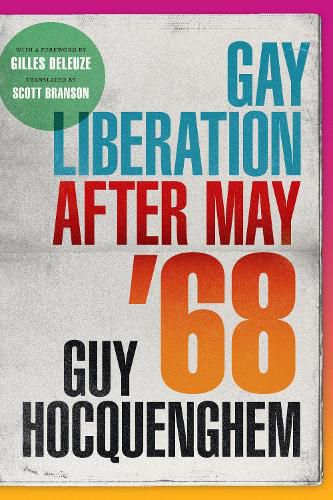Readings Newsletter
Become a Readings Member to make your shopping experience even easier.
Sign in or sign up for free!
You’re not far away from qualifying for FREE standard shipping within Australia
You’ve qualified for FREE standard shipping within Australia
The cart is loading…






In Gay Liberation after May ‘68, first published in France in 1974 and appearing here in English for the first time, Guy Hocquenghem details the rise of the militant gay liberation movement alongside the women’s movement and other revolutionary organizing. Writing after the apparent failure and eventual selling out of the revolutionary dream of May 1968, Hocquenghem situates his theories of homosexual desire in the realm of revolutionary practice, arguing that revolutionary movements must be rethought through ideas of desire and sexuality that undo stable gender and sexual identities. Throughout, he persists in a radical vision of the world framed through a queerness that can dismantle the oppressions of capitalism and empire, the family, institutions, and, ultimately, civilization. The articles, communiques, and manifestos that compose the book give an archival glimpse at the issues queer revolutionaries faced while also speaking to today’s radical queers as they look to transform their world.
$9.00 standard shipping within Australia
FREE standard shipping within Australia for orders over $100.00
Express & International shipping calculated at checkout
In Gay Liberation after May ‘68, first published in France in 1974 and appearing here in English for the first time, Guy Hocquenghem details the rise of the militant gay liberation movement alongside the women’s movement and other revolutionary organizing. Writing after the apparent failure and eventual selling out of the revolutionary dream of May 1968, Hocquenghem situates his theories of homosexual desire in the realm of revolutionary practice, arguing that revolutionary movements must be rethought through ideas of desire and sexuality that undo stable gender and sexual identities. Throughout, he persists in a radical vision of the world framed through a queerness that can dismantle the oppressions of capitalism and empire, the family, institutions, and, ultimately, civilization. The articles, communiques, and manifestos that compose the book give an archival glimpse at the issues queer revolutionaries faced while also speaking to today’s radical queers as they look to transform their world.